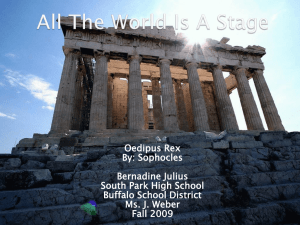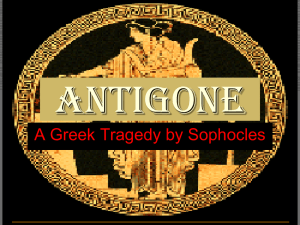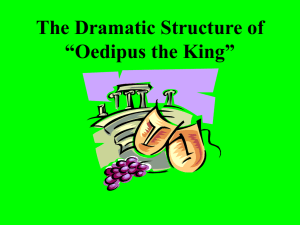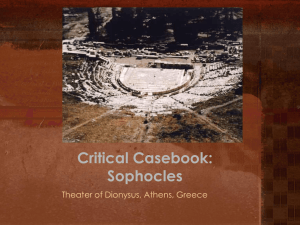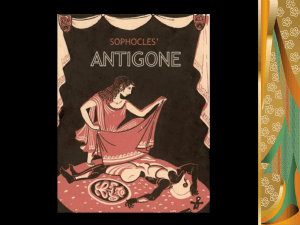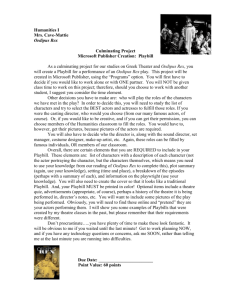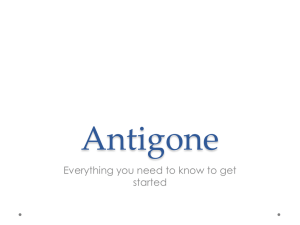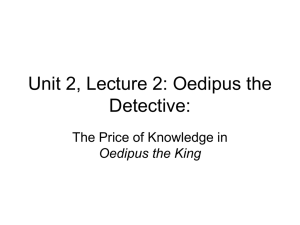Oedipus Rex - sb169.k12.sd.us
advertisement
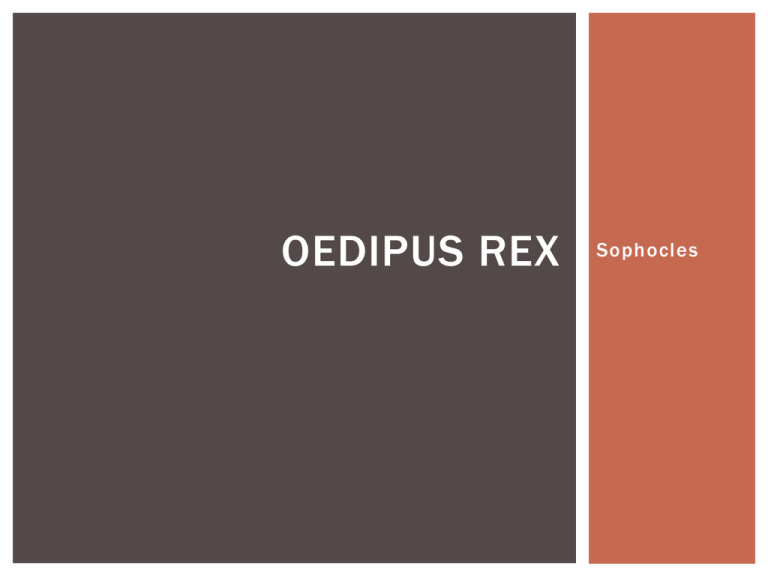
OEDIPUS REX Sophocles OBJECTIVES FOR TODAY To introduce/revisit origins of Greek theater with its beginning in religious ritual of Ancient Greece To understand Greek theater within the context of its time To understand the basic problem of the play and the major characters through an analysis of the Prologos, Parados, and Scene I. To consider the use, contribution, and nature of dramatic irony THE GREEKS Golden Age of Greek culture – 5 th century BCE We owe debt to for development of Western thought and culture. AKA the “Classic Age” genius in drama – our Greek heritage – we study it for its universality its extension into modern dramatic literature, including Shakespeare Western culture = northern hemisphere, excluding Asia Began in Ancient Greece, esp. Athens Almost everything we do, watch, appreciate, participate in as a society had its foundation in the Athenian world. DRAMA Oedipus Rex AKA Oedipus the King and Oedipus Tyrannous The people in the audience knew this legend. So what Sophocles does is not merely retell an old story, but he transforms it from a tale of individual woe into an archetypal chronicle of human frailty, pride, and punishment. Aristotle called it the most perfect tragedy available in his time IN MEDIA RES In medias res or medias in res (into the middle of things) is a Latin phrase denoting the literary and artistic narrative technique wherein the relation of a story begins either at the midpoint or at the conclusion, rather than at the beginning This play begins barely one hour before the destruction of Oedipus, before he discovers the truth of his identity. GREEK THEATER What do you know? Tied to religious ritual Celebrates the Olympian gods Gods often appear as characters in the play determining the fate of humankind, reflecting religious beliefs of the day Legendary heroes and kings often become protagonists in Greek tragedy. Important enough to shut down business and daily activities for wee-long festivals. Citizens (men who were not slaves) were expected to attend, and even to participate in the performances. Sometimes they were in the chorus, considered a civic duty of a citizen. Or, they might be expected to give knowledgeable responses to direct questions from major characters. Believed plays should be instructive as well as entertaining Audience should take have a take-home lesson Plays showed a pro-Athenian political bias www.m-w.com THE THEATER Was a temple Housed 15,000 people Acoustically perfect Lack of scenery Actors trained in oratory – as long as the audience could hear, they can follow the play Lines in the play denote the setting, the passage of time, the characters’ names, sometimes the emotions the actor was feeling, and sometimes the stage movements. SOPHOCLES Notable as he added a third actor. Started with just a chorus that did dances and songs as part of the religious celebration to honor Dionysus, the god of wine and procreation Thespis became the 1 st actor – a character who stepped out from the chorus to speak lines, often as a god Playwright Aeschylus added a second actor. Made each tragedy an entity unto itself, instead of 3 plays to tell one story. Wrote Electra. Oedipus the King is considered a masterpiece Mystery, dramatic development, irony & characterization Aristotle considered it the most perfect tragedy ACTORS An actor would play more than one role. Sometimes one role would be played by more than one actor, all depending on logistics. Actors were highly respected, often exempt from military duty. Women couldn’t be actors, and if they were allowed to see the play at all, they had to sit in the nosebleed seats. MASKS AND MOUTHS Would clue the audience to what character was being played. Costumes were larger than life and made it easier to see the actors, but they also gave elevated status to the roles. Actors wore platform shoes. Makes the actors quite immobile Oratory style is lengthy monologues and stichomythic dialogues, or debates, a rhetorical style of the period. www2.bc.edu www.wikipedia.org BIG G AND LITTLE G: WRITE IT RIGHT From Grammar Girl: Do You Ca pitalize t he Word " God"? One of the m ost common questions people ask about religious words is whether to capitalize t he word “god.” T he name of any specific deity is capitalized just like any other name, so when “God” is used to refer to “t he one God,” ( in other words, in any m onotheistic religion) it is capitalized. For example, you’d capitalize “God” in t his sentence: Some Christians g ive t hanks to God before ever y m eal. When referring to g ods in g eneral, however, or u sing t he word "g od" descriptively, keep it lowercase: The Romans believed a god named Jupiter ruled the heavens. The Greek gods were always causing trouble for humans. T he same rule holds t rue for Yahweh, A llah, Z eus, and the names of g ods in other religions. T hey are capitalized . http://grammar.quickanddirtytips.com/do-you-capitalize-god.aspx HAMILTON’S MY THOLOGY Everyone would have known the Oedipus legend Not about how it turns out; IS about how Sophocles plays it out Creates dramatic irony occurs when readers know more about a situation or a character than the characters do Effect suspense, drama Words or acts of characters carry a meaning unperceived by the character but understood by the audience Usually, character’s own interests are involved in a way that he/she cannot understand Irony resides in contrast between what character intends and the different significance seen by others In tragedy, known as tragic irony – when character uses words that mean one thing to the speaker and another to those better acquainted with the real situation, esp. when the character is about to become a tragic victim of fate. LET’S READ P. 194, Prologue – opening scene of exposition; sets time, place, and situation of the drama; creates tone Need Oedipus, Priest, Creon Read with dramatic gusto! Discuss: 1. What does the priest say to Oedipus? 2. What qualities do we immediately see in Oepidus? 3. What ironies are introduced in the prologue? 4. What news does Creon bring from Delphi? PARADOS Parade of entry; entrnace ode by chorus Chorus – 12- 15 men A group of actors in Greek tragedy who commented on the action of the play, giving insights into the themes. They represented the voice of public opinion responding to the tragic events unfolding in the drama. Between scenes the chorus sang and danced to musical accompaniment. Choragus – leader of chorus who participates in dialogue with the actors; only member of chorus who does so Read stanza by stanza, popcorn -style, with dramatic gusto! DISCUSS What is the mood of the chorus upon its entrance? What appeals do they make? SCENE 1 New people: Need Oedipus, Choragos, Tiresias With dramatic gusto! Discuss: What initial signs of rashness do we see in Oepidus? What seems to be Tiresias’ philosophical attitude? What ironies arise in the scene? What false conclusion does Oedipus reach as a result of his quarrel with Tiresias? What ef fect will this conclusion have on him? What role does the Choragos (sometimes called the first senator) play in the quarrel? ASSIGNMENT FOR TOMORROW Read the Ode I through Scene II, pages 207-217 - answer the questions in pink packet, page 3 for tomorrow. (Ignore the handwritten stuff in parentheses. That was for another edition of text.) Please bring your Oedipus text and pink packet to class EVERY DAY until further notice. Reminder: V3 quiz tomorrow. Extra Credit opportunity: Look online for details. TODAY Vocab 3 quiz. Objectives: To emphasize the importance of enquiry, rational thinking, and debate in Greek life To understand and experiment with stichomythia, a poetic device originating in classical Greek tragedy DISCUSSION: ODE I, SCENE II Answers to pink packet questions. STICHOMY THIA Define – see page 7. Examples ASSIGNMENTS FOR MONDAY: Finish reading the play. Make notes and be prepared to discuss at least 4-5 specific examples of the use of dramatic irony. There may be a reading quiz . A: Stic homythic dialogue: (Study handout page on Stic homythic Dialogue in pic k pac ket) With one other partner (from any class period*) or on your own, create an example of stichomythic dialogue between two people with opposing points of view on any topic (school appropriate please). Consider the characteristics of stichomythia we discussed and mimic those in your dialogue. (Avoid name-calling or personal insults. Instead, create intelligent arguments on both sides of the issue.) Be prepared to per form the dialogue for the class. *Print or make two copies so each per former has one; print four if you choose a student from another class period to work with because singles or those with partners from another class will use a stand in from your class period to read in place of your writing partner if you are selected to per form. You may speak as yourselves, or you may create characters. Create a minimum of 8 exchanges (each character speaks 8 times). Dialogues must be typed or handwriting must be ver y legible. Due Monday, 10-22. No late work accepted; these will be shared in class Monday. Please bring your vocab books M onday.


